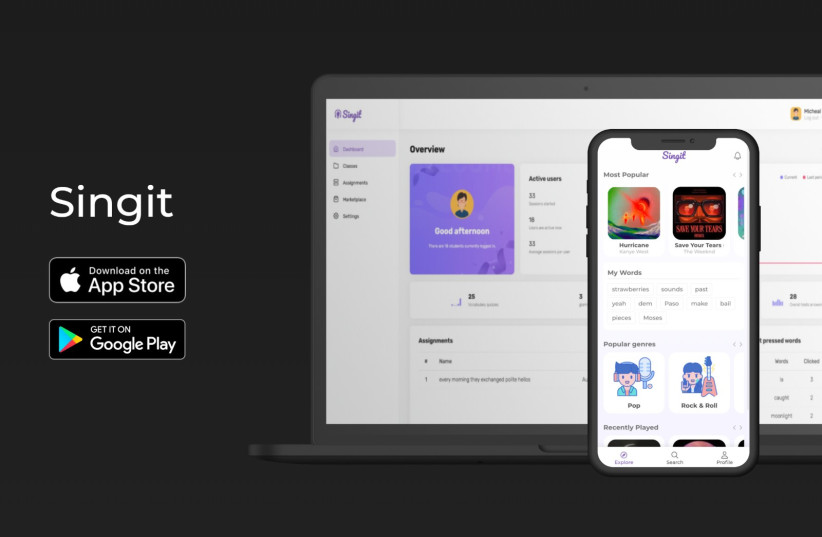A new app will soon help more than 50,000 Israeli students learn English through an innovative app that immerses them in popular music.
“There is so much research out there that shows how music can help students learn,” says Michael Peled, founder and CEO of Singit. “For example, if you show any Israeli the word ‘supercalifragilisticexpialidocious’ from the famous Mary Poppins song, they immediately recognize the word in print and pronounce it correctly, because of the way they heard it repeated in the song as kids. I found that mind-blowing.
“Getting kids to interact with the words in real life through music is a very effective learning tool, and we are finding that dyslexic and special education students are responding especially well,” he said.
Peled’s app was recently approved by the Ministry of Education after more than a year of testing with thousands of students and will start being used by students in fifth through ninth grade in some schools starting later this month.
Students can listen on any digital device to music from a huge library of songs and follow along with the lyrics on the screen. When they encounter a word that they don’t recognize, they can click the word. With the help of AI and Machine Learning technology, the system learns the needs of each student and offers additional songs with the words he didn’t know. After hearing the song, students are given an automated test that tests them for the words they clicked on to ensure improvement.
“It is like using Spotify,” Peled says. “We partner with a company called LyricFind that provides access to more than five million songs from all genres and time periods. Most schools won’t want to offer access to many types of songs, due to explicit lyrics and the other educational considerations of each school, but that will still leave more than 100,000 songs they can hear.”

MEANWHILE, teachers can send students customized assignments and grammar tests, or even create assignments automatically using customized tools. Educators can also access all relevant data and insights about a student’s performance from their phones or computers. “You can send students a question from your device to theirs in about 30 seconds,” Peled says.
Pilot tests show that the app increased students’ interaction with the English language by 62% even after school hours, the company said.
“A few dozen schools around the country, including ten special education schools, have already purchased the app, and will begin using it as of October 17,” Peled says. “By the end of the year, we will have about 53,000 students around the country using it, with more coming after that.”
For Peled, who has struggled with dyslexia throughout his life, the product launch is the culmination of a life’s journey. Just 21 years old and still in army service in the Ofek unit in the Air Force, he learned at an early age that he would have to work harder than others in order to succeed.
“My family is all dyslexic, and I was diagnosed with it when I was three years old,” Peled says. “As a kid, I could do math like other students, but I couldn’t read normally until I was in 7th grade, and I had to work really hard to be average in high school. From the start, I knew that I wasn’t a normal kid and that I would have to work harder than everybody else, but that forced me to excel.”
BECAUSE OF his hard work, Peled was able to attend a computer program for gifted students at the Weizmann Institute of Science, and launched Singit with the help of a partner several years older than him. “My father gave me the idea to use music to teach. He was dyslexic in the 1970s, when no one in Israel knew how to handle it, and he learned English by listening to the Beatles and Pink Floyd,” Peled says. “the first version of the app we built in 2017 was bad, but by 2019, we had a functioning product, and we tested it throughout 2020.”
The tests found the most significant results from two groups of students: gifted kids and special needs kids. “At first, we thought the app would only be used by gifted students, but a dyslexic kid came up to us after using it, and was very emotional. He said he’d been using music to learn, and that the app was doing exactly what he needed. We understood at that point how valuable it could be for special needs students, which was ultimately why we started this whole project in the first place.”
Peled has big ambitions for Singit. “The app costs NIS 300 per class, but we gave it to the Education Ministry for free because we want to have it on the phone of every special education student in Israel,” he says. “Our next goal is to expand to other countries around the world, to Asia, Brazil, and other places where they teach English as a second language.
“I believe that in a year and a half, we will have more than two million users,” he said. “The main performance metric we are measuring is how many songs people listen to.”
The app will be made available to the general public for download in November here.
